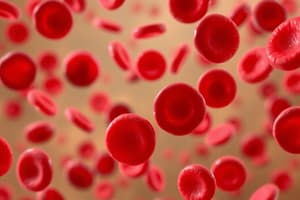Podcast
Questions and Answers
What is the primary function of erythropoietin in the body?
What is the primary function of erythropoietin in the body?
- To stimulate the production of red blood cells (correct)
- To stimulate the production of plasma proteins
- To regulate the production of platelets
- To stimulate the production of white blood cells
What is the result of nuclear condensation and enucleation in erythroblasts?
What is the result of nuclear condensation and enucleation in erythroblasts?
- The formation of mature RBCs
- The formation of platelets
- The formation of erythroid precursors
- The formation of reticulocytes (correct)
What is essential for hemoglobin synthesis during erythropoiesis?
What is essential for hemoglobin synthesis during erythropoiesis?
- Vitamin B12
- Vitamin C
- Folic acid
- Iron (correct)
What is the term for a condition characterized by a decrease in RBCs or hemoglobin?
What is the term for a condition characterized by a decrease in RBCs or hemoglobin?
What is the result of erythropoietin therapy in patients with chronic kidney disease?
What is the result of erythropoietin therapy in patients with chronic kidney disease?
What is the stage of erythropoiesis in which erythroid precursors mature into erythroblasts?
What is the stage of erythropoiesis in which erythroid precursors mature into erythroblasts?
What can suppress erythropoiesis during inflammation?
What can suppress erythropoiesis during inflammation?
What is the term for a condition characterized by an increase in RBCs and hemoglobin?
What is the term for a condition characterized by an increase in RBCs and hemoglobin?
Flashcards are hidden until you start studying
Study Notes
Erythropoiesis: An Overview
Definition
Erythropoiesis is the process by which red blood cells (RBCs) are produced in the body.
Stages of Erythropoiesis
- Erythropoietin (EPO) production: EPO is produced by the kidneys in response to hypoxia (low oxygen levels) and stimulates the production of RBCs.
- Erythroid precursor formation: EPO binds to receptors on erythroid precursors in the bone marrow, stimulating their proliferation and differentiation.
- Erythroblast formation: Erythroid precursors mature into erythroblasts, which are large, nucleated cells.
- Nuclear condensation and enucleation: Erythroblasts undergo nuclear condensation and enucleation, resulting in the formation of reticulocytes.
- Maturation of reticulocytes: Reticulocytes mature into mature RBCs, which are released into the circulation.
Regulation of Erythropoiesis
- EPO: The primary regulator of erythropoiesis, EPO stimulates the production of RBCs in response to hypoxia.
- Iron availability: Iron is essential for hemoglobin synthesis, and iron deficiency can lead to impaired erythropoiesis.
- Inflammation: Inflammatory cytokines can suppress erythropoiesis.
- Hormonal regulation: Hormones such as testosterone and thyroxine can stimulate erythropoiesis.
Clinical Relevance
- Anemia: Disorders of erythropoiesis can lead to anemia, a condition characterized by a decrease in RBCs or hemoglobin.
- Polycythemia: Overproduction of RBCs can lead to polycythemia, a condition characterized by an increase in RBCs and hemoglobin.
- Erythropoietin therapy: Recombinant EPO is used to treat anemia in patients with chronic kidney disease.
Erythropoiesis
- Erythropoiesis is the process by which red blood cells (RBCs) are produced in the body.
Stages of Erythropoiesis
- Erythropoietin (EPO) is produced by the kidneys in response to hypoxia (low oxygen levels) and stimulates the production of RBCs.
- EPO binds to receptors on erythroid precursors in the bone marrow, stimulating their proliferation and differentiation.
- Erythroid precursors mature into erythroblasts, which are large, nucleated cells.
- Erythroblasts undergo nuclear condensation and enucleation, resulting in the formation of reticulocytes.
- Reticulocytes mature into mature RBCs, which are released into the circulation.
Regulation of Erythropoiesis
- EPO is the primary regulator of erythropoiesis, stimulating the production of RBCs in response to hypoxia.
- Iron availability is essential for hemoglobin synthesis, and iron deficiency can lead to impaired erythropoiesis.
- Inflammatory cytokines can suppress erythropoiesis.
- Hormones such as testosterone and thyroxine can stimulate erythropoiesis.
Clinical Relevance
- Disorders of erythropoiesis can lead to anemia, a condition characterized by a decrease in RBCs or hemoglobin.
- Overproduction of RBCs can lead to polycythemia, a condition characterized by an increase in RBCs and hemoglobin.
- Recombinant EPO is used to treat anemia in patients with chronic kidney disease.
Studying That Suits You
Use AI to generate personalized quizzes and flashcards to suit your learning preferences.




